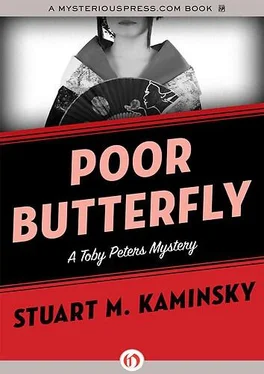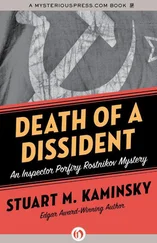Stuart Kaminsky - Poor Butterfly
Здесь есть возможность читать онлайн «Stuart Kaminsky - Poor Butterfly» весь текст электронной книги совершенно бесплатно (целиком полную версию без сокращений). В некоторых случаях можно слушать аудио, скачать через торрент в формате fb2 и присутствует краткое содержание. Жанр: Криминальный детектив, на английском языке. Описание произведения, (предисловие) а так же отзывы посетителей доступны на портале библиотеки ЛибКат.
- Название:Poor Butterfly
- Автор:
- Жанр:
- Год:неизвестен
- ISBN:нет данных
- Рейтинг книги:4 / 5. Голосов: 1
-
Избранное:Добавить в избранное
- Отзывы:
-
Ваша оценка:
- 80
- 1
- 2
- 3
- 4
- 5
Poor Butterfly: краткое содержание, описание и аннотация
Предлагаем к чтению аннотацию, описание, краткое содержание или предисловие (зависит от того, что написал сам автор книги «Poor Butterfly»). Если вы не нашли необходимую информацию о книге — напишите в комментариях, мы постараемся отыскать её.
Poor Butterfly — читать онлайн бесплатно полную книгу (весь текст) целиком
Ниже представлен текст книги, разбитый по страницам. Система сохранения места последней прочитанной страницы, позволяет с удобством читать онлайн бесплатно книгу «Poor Butterfly», без необходимости каждый раз заново искать на чём Вы остановились. Поставьте закладку, и сможете в любой момент перейти на страницу, на которой закончили чтение.
Интервал:
Закладка:
He began to fidget with the rings on his fingers. He stopped fidgeting and reached for a cigar in the humidor on his desk.
“I don’t smoke in front of the Maestro,” he said. “Would you like one?”
“No,” I said.
He lit up and felt better. It wasn’t an El Cheapo. I could take the smell for a while.
“We begin,” I said, “with a list of everyone connected with this opera, everyone who might be a target.”
“Then you believe …”
“No,” I said. “But I’m being paid to act like I believe.”
“The list is long,” he said. “Contractors, musicians, office staff, cast, costume shop, set construction, lighting engineers. I’ll get it for you.”
“Put a check in front of the names of everyone who was here when Wyler fell,” I said. “How many people were in the building that morning?”
Lundeen thought about it, looked at his cigar, belched out smoke.
“I don’t know. A few dozen perhaps,” he said. “No, more. The orchestra, but they were together in the auditorium when it happened. I remember …”
“Cross check,” I told him. “Give me the names of everyone who was in the theater.”
“I see. Whoever was with us rehearsing couldn’t have killed Wyler.”
“Unless more than one person is involved,” I said. “The Erik note said, ‘ We are watching.’”
“The royal ‘we,’ perhaps,” Lundeen said, pointing the cigar at me. “Or an allusion to his belief that he represents more than himself.”
“Put a few people on it. Ask who was here. Ask them who they remember being here. See if someone remembers someone being here who claims he or she wasn’t here.”
“Elimination will lead us …” he began with enthusiasm.
“… probably nowhere,” I said. “But that’s where we start. And we’ll need people here twenty-four hours a day watching and protecting while I look for our playmate Erik. That’ll cost.”
“Since we stand to lose over two million dollars if we do not open Butterfly to reasonably good sales,” he said, “we’ll pay for protection. Do you have a service in mind?”
“I could bring my staff up from Los Angeles,” I said, rubbing my chin, thinking about a bonus.
“Fine.”
“We’re a little unorthodox,” I warned.
“So is an opera,” Lundeen said, now rubbing his rings while he continued to puff at the El Perfecto.
“Let’s say one week through opening night. Flat fee of five hundred dollars above what you’re already paying me. If we have to go longer, we’ll talk about it later.”
“Sounds most reasonable.”
“I’ll get on it. Now I’d like a tour and an introduction to anyone around.”
Lundeen walked me through the dark palace, through closed-off wings, into dark rooms filled with racks of costumes, props, and ancient light stands. Rows of dressing rooms, rehearsal rooms, offices, rooms filled with books, walls covered with paintings and posters demonstrated the master touch of old man Keel, who never knew when too much was too much. We passed some people working, painting, sweeping, but the dozen or so of them were lost in the vastness of the place.
“Impressive,” I said.
“Expensive,” Lundeen sighed. “It’ll take years to fully restore it. The last opera performed here was La Forza Del Destino in 1904.”
“Al Capone liked that one,” I said as we walked.
“Al Capone?”
I didn’t elaborate. I changed the subject.
“What was your specialty?” I asked as we moved into a hallway behind the stage that seemed to be in good shape and well lighted.
“Rossini, Massenet, Bizet, some Mozart, Puccini,” he said. “I did a very credible Pinkerton in Madame Butterfly on a national tour in 1934, but I was considered too light, my voice too popular, for Wagner or even Verdi. I regretted the loss of Verdi, but not of Wagner. That I considered a blessing. Here.”
We stopped in front of a dressing room door. There were voices behind it. Lundeen knocked. A woman said, “Come in.”
In we went.
Vera Tenatti was seated in front of a mirror on a dressing table, one of those mirrors with bulbs around it. Almost all the bulbs were working. A copy of Woman’s Day lay on the table in front of her. Two cute white dogs looked up at her from the cover. The opera diva wasn’t looking at the dogs. She was staring at herself, and she didn’t look pleased by what she saw. An older woman in a dark suit, slender, blond-the woman who had led Vera off the stage-sat next to her, petting the little dog, who began yapping at me.
“Lorna Bartholomew, Vera Tenatti,” Lundeen said, closing the door behind him. “This is Toby Peters, the investigator we’ve hired.”
Lorna stood with a cool hand and a smile. She was polite, handsome, and somewhere else. The dog snapped at my hand.
“I talked to Mr. Peters on the phone,” she said, releasing my hand. “I’m glad you could come. This is Miguelito. He’s a miniature poodle with a very delicate temper.”
“Charmed,” I said.
“Vera?” Lorna touched the young woman’s shoulder. The touch woke Vera from her fascination with her image and she turned.
“I’m fat,” she said.
“I’m Peters,” I said. “And you’re not fat.”
She looked at herself in the mirror again and repeated, “I’m fat.”
“Occupational hazard,” sighed Lundeen. “It takes a strong body, lungs to project. The body must be maintained like a fine instrument. There are no thin cellos. A thin cello would have no depth.”
“It would be a violin,” said Vera. “I would rather be a violin than a cello.”
“I think you’re cute,” I said. “And you’ve got a great voice.”
She turned from the mirror to look at me. I was telling the truth. She knew it. The smile was grateful.
“Mr. Peters simply wants to meet everyone,” Lundeen explained. “And to know if you remember where you were and who you saw last week when that workman died.”
I pulled my pencil and small spiral notebook out of my pocket, ready to start putting things together.
“We were here,” said Lorna, reaching for a black purse on the dressing table and fishing out a pack of Tareytons. “Stoki was here. A few plasterers, the orchestra, the principals. No chorus.”
“The crazy old man,” Vera added.
“Crazy old man?” I asked.
“Raymond,” Lundeen said. “He came with the place. Caretaker. Knows where everything is. He was here before the place closed down in 1905. Makes little sense. He was with Lorna and me when Wyler fell. The three of us saw the man in the cape.”
“I’d like to meet Raymond,” I said.
Lundeen nodded. Since Lorna was standing and smoking, Lundeen took the opportunity to sit in the chair she and Miguelito had vacated. The wooden piece cringed under his weight but held.
“There were others,” Lorna said. “But who remembers? We were rehearsing.”
“Vera was in the middle of her second act solo,” Lundeen added. “And Martin was …”
“Martin?” I asked.
“Passacaglia, the tenor,” Lundeen explained. “He was in his dressing room, I think.”
“He wasn’t on stage,” Lorna confirmed. “But neither was Pepe, the … who remembers?”
I put my notebook away.
“Do you need me for anything more?” Lorna said, looking into my eyes as she petted Miguelito. It was a Lana Turner line. She handled it so well I couldn’t tell if she was being polite or encouraging.
“Not now,” I said. “I’d like to talk to Miss Tenatti first.”
Lorna shrugged a suit-yourself shrug. “John knows how to reach me,” she said, putting out her cigarette in a glass ashtray near Vera’s elbow.
“I’ll see you tomorrow, Vera.”
Читать дальшеИнтервал:
Закладка:
Похожие книги на «Poor Butterfly»
Представляем Вашему вниманию похожие книги на «Poor Butterfly» списком для выбора. Мы отобрали схожую по названию и смыслу литературу в надежде предоставить читателям больше вариантов отыскать новые, интересные, ещё непрочитанные произведения.
Обсуждение, отзывы о книге «Poor Butterfly» и просто собственные мнения читателей. Оставьте ваши комментарии, напишите, что Вы думаете о произведении, его смысле или главных героях. Укажите что конкретно понравилось, а что нет, и почему Вы так считаете.












